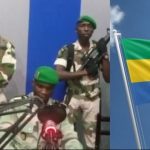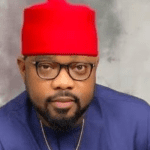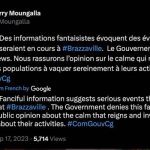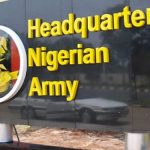The trial of 51 people, including three Americans, who are charged with trying to topple the Democratic Republic of the Congo’s president last month, has began.
The defendants were carried into the military court in blue-and-yellow shirts, their first appearance in public since the failed coup.
They were arrested during attacks on the presidential palace and the home of a President Félix Tshisekedi loyalist, and they are facing a number of allegations, including financing terrorism, murder, and attempted assassination.
According to Sylvain Ekenge, the DRC military spokesman, the attackers initially wanted to attack the residences of Judith Suminwa, who was nominated in early April by President Felix Tshisekedi as the new prime minister, and then-defense minister Jean-Pierre Bemba, but could not “identify the home” of the first and “did not find” the second at home.
The putschists attacked the residence of Vital Kamerhe, then vice-prime minister, before breaking into the Palace of the Nation, where the offices of President Tshisekedi are located.
The US State Department says it has not been given access to its citizens in custody.
Six people were killed during the attempted coup on 19 May, including the suspected leader of the plot Christian Malanga.
The rest of the defendants were detained after the attack on the Palais de la Nation and the home of Vital Kamerhe, who is the parliamentary speaker.
Local media reports said the assailants were members of the New Zaire Movement linked to Malanga, a formerly exiled DR Congo politician who had acquired US citizenship.
His son Marcel Malanga is among the US nationals who were arrested.
Another is 21-year-old Tyler Thompson, said this week they had “zero idea” how he had become entangled in the plan.
Other people of various nationalities were also involved and are being tried, according to army spokesman General Sylvain Ekenge.
One is a Congolese guy with Belgian nationality, while the other is a Canadian citizen born in the Democratic Republic of the Congo.
According to the AFP news agency, an investigation is also underway into the actions of the soldiers who foiled the coup, who are accused of carrying out killings following the operation.
President Tshisekedi was re-elected to a second term in contested elections in December of last year. He received almost 78% of the vote.
Nearly 20 individuals were killed in election-related violence leading up to the vote.
DR Congo is a country with great natural resources and a large population, but living for the majority of people has not improved, with violence, corruption, and poor government still prevalent.
Much of the country’s natural riches are located in the east, where violence persists despite Mr Tshisekedi’s efforts to address the problem by imposing a state of siege, negotiating ceasefires, and deploying regional soldiers.
The trial of 51 people, including three Americans, who are charged with trying to topple the Democratic Republic of the Congo’s president last month, has began.
The defendants were carried into the military court in blue-and-yellow shirts, their first appearance in public since the failed coup.
They were arrested during attacks on the presidential palace and the home of a President Félix Tshisekedi loyalist, and they are facing a number of allegations, including financing terrorism, murder, and attempted assassination.
According to Sylvain Ekenge, the DRC military spokesman, the attackers initially wanted to attack the residences of Judith Suminwa, who was nominated in early April by President Felix Tshisekedi as the new prime minister, and then-defense minister Jean-Pierre Bemba, but could not “identify the home” of the first and “did not find” the second at home.
The putschists attacked the residence of Vital Kamerhe, then vice-prime minister, before breaking into the Palace of the Nation, where the offices of President Tshisekedi are located.
The US State Department says it has not been given access to its citizens in custody.
Six people were killed during the attempted coup on 19 May, including the suspected leader of the plot Christian Malanga.
The rest of the defendants were detained after the attack on the Palais de la Nation and the home of Vital Kamerhe, who is the parliamentary speaker.
Local media reports said the assailants were members of the New Zaire Movement linked to Malanga, a formerly exiled DR Congo politician who had acquired US citizenship.
His son Marcel Malanga is among the US nationals who were arrested.
Another is 21-year-old Tyler Thompson, said this week they had “zero idea” how he had become entangled in the plan.
Other people of various nationalities were also involved and are being tried, according to army spokesman General Sylvain Ekenge.
One is a Congolese guy with Belgian nationality, while the other is a Canadian citizen born in the Democratic Republic of the Congo.
According to the AFP news agency, an investigation is also underway into the actions of the soldiers who foiled the coup, who are accused of carrying out killings following the operation.
President Tshisekedi was re-elected to a second term in contested elections in December of last year. He received almost 78% of the vote.
Nearly 20 individuals were killed in election-related violence leading up to the vote.
DR Congo is a country with great natural resources and a large population, but living for the majority of people has not improved, with violence, corruption, and poor government still prevalent.
Much of the country’s natural riches are located in the east, where violence persists despite Mr Tshisekedi’s efforts to address the problem by imposing a state of siege, negotiating ceasefires, and deploying regional soldiers.
The trial of 51 people, including three Americans, who are charged with trying to topple the Democratic Republic of the Congo’s president last month, has began.
The defendants were carried into the military court in blue-and-yellow shirts, their first appearance in public since the failed coup.
They were arrested during attacks on the presidential palace and the home of a President Félix Tshisekedi loyalist, and they are facing a number of allegations, including financing terrorism, murder, and attempted assassination.
According to Sylvain Ekenge, the DRC military spokesman, the attackers initially wanted to attack the residences of Judith Suminwa, who was nominated in early April by President Felix Tshisekedi as the new prime minister, and then-defense minister Jean-Pierre Bemba, but could not “identify the home” of the first and “did not find” the second at home.
The putschists attacked the residence of Vital Kamerhe, then vice-prime minister, before breaking into the Palace of the Nation, where the offices of President Tshisekedi are located.
The US State Department says it has not been given access to its citizens in custody.
Six people were killed during the attempted coup on 19 May, including the suspected leader of the plot Christian Malanga.
The rest of the defendants were detained after the attack on the Palais de la Nation and the home of Vital Kamerhe, who is the parliamentary speaker.
Local media reports said the assailants were members of the New Zaire Movement linked to Malanga, a formerly exiled DR Congo politician who had acquired US citizenship.
His son Marcel Malanga is among the US nationals who were arrested.
Another is 21-year-old Tyler Thompson, said this week they had “zero idea” how he had become entangled in the plan.
Other people of various nationalities were also involved and are being tried, according to army spokesman General Sylvain Ekenge.
One is a Congolese guy with Belgian nationality, while the other is a Canadian citizen born in the Democratic Republic of the Congo.
According to the AFP news agency, an investigation is also underway into the actions of the soldiers who foiled the coup, who are accused of carrying out killings following the operation.
President Tshisekedi was re-elected to a second term in contested elections in December of last year. He received almost 78% of the vote.
Nearly 20 individuals were killed in election-related violence leading up to the vote.
DR Congo is a country with great natural resources and a large population, but living for the majority of people has not improved, with violence, corruption, and poor government still prevalent.
Much of the country’s natural riches are located in the east, where violence persists despite Mr Tshisekedi’s efforts to address the problem by imposing a state of siege, negotiating ceasefires, and deploying regional soldiers.
The trial of 51 people, including three Americans, who are charged with trying to topple the Democratic Republic of the Congo’s president last month, has began.
The defendants were carried into the military court in blue-and-yellow shirts, their first appearance in public since the failed coup.
They were arrested during attacks on the presidential palace and the home of a President Félix Tshisekedi loyalist, and they are facing a number of allegations, including financing terrorism, murder, and attempted assassination.
According to Sylvain Ekenge, the DRC military spokesman, the attackers initially wanted to attack the residences of Judith Suminwa, who was nominated in early April by President Felix Tshisekedi as the new prime minister, and then-defense minister Jean-Pierre Bemba, but could not “identify the home” of the first and “did not find” the second at home.
The putschists attacked the residence of Vital Kamerhe, then vice-prime minister, before breaking into the Palace of the Nation, where the offices of President Tshisekedi are located.
The US State Department says it has not been given access to its citizens in custody.
Six people were killed during the attempted coup on 19 May, including the suspected leader of the plot Christian Malanga.
The rest of the defendants were detained after the attack on the Palais de la Nation and the home of Vital Kamerhe, who is the parliamentary speaker.
Local media reports said the assailants were members of the New Zaire Movement linked to Malanga, a formerly exiled DR Congo politician who had acquired US citizenship.
His son Marcel Malanga is among the US nationals who were arrested.
Another is 21-year-old Tyler Thompson, said this week they had “zero idea” how he had become entangled in the plan.
Other people of various nationalities were also involved and are being tried, according to army spokesman General Sylvain Ekenge.
One is a Congolese guy with Belgian nationality, while the other is a Canadian citizen born in the Democratic Republic of the Congo.
According to the AFP news agency, an investigation is also underway into the actions of the soldiers who foiled the coup, who are accused of carrying out killings following the operation.
President Tshisekedi was re-elected to a second term in contested elections in December of last year. He received almost 78% of the vote.
Nearly 20 individuals were killed in election-related violence leading up to the vote.
DR Congo is a country with great natural resources and a large population, but living for the majority of people has not improved, with violence, corruption, and poor government still prevalent.
Much of the country’s natural riches are located in the east, where violence persists despite Mr Tshisekedi’s efforts to address the problem by imposing a state of siege, negotiating ceasefires, and deploying regional soldiers.
The trial of 51 people, including three Americans, who are charged with trying to topple the Democratic Republic of the Congo’s president last month, has began.
The defendants were carried into the military court in blue-and-yellow shirts, their first appearance in public since the failed coup.
They were arrested during attacks on the presidential palace and the home of a President Félix Tshisekedi loyalist, and they are facing a number of allegations, including financing terrorism, murder, and attempted assassination.
According to Sylvain Ekenge, the DRC military spokesman, the attackers initially wanted to attack the residences of Judith Suminwa, who was nominated in early April by President Felix Tshisekedi as the new prime minister, and then-defense minister Jean-Pierre Bemba, but could not “identify the home” of the first and “did not find” the second at home.
The putschists attacked the residence of Vital Kamerhe, then vice-prime minister, before breaking into the Palace of the Nation, where the offices of President Tshisekedi are located.
The US State Department says it has not been given access to its citizens in custody.
Six people were killed during the attempted coup on 19 May, including the suspected leader of the plot Christian Malanga.
The rest of the defendants were detained after the attack on the Palais de la Nation and the home of Vital Kamerhe, who is the parliamentary speaker.
Local media reports said the assailants were members of the New Zaire Movement linked to Malanga, a formerly exiled DR Congo politician who had acquired US citizenship.
His son Marcel Malanga is among the US nationals who were arrested.
Another is 21-year-old Tyler Thompson, said this week they had “zero idea” how he had become entangled in the plan.
Other people of various nationalities were also involved and are being tried, according to army spokesman General Sylvain Ekenge.
One is a Congolese guy with Belgian nationality, while the other is a Canadian citizen born in the Democratic Republic of the Congo.
According to the AFP news agency, an investigation is also underway into the actions of the soldiers who foiled the coup, who are accused of carrying out killings following the operation.
President Tshisekedi was re-elected to a second term in contested elections in December of last year. He received almost 78% of the vote.
Nearly 20 individuals were killed in election-related violence leading up to the vote.
DR Congo is a country with great natural resources and a large population, but living for the majority of people has not improved, with violence, corruption, and poor government still prevalent.
Much of the country’s natural riches are located in the east, where violence persists despite Mr Tshisekedi’s efforts to address the problem by imposing a state of siege, negotiating ceasefires, and deploying regional soldiers.
The trial of 51 people, including three Americans, who are charged with trying to topple the Democratic Republic of the Congo’s president last month, has began.
The defendants were carried into the military court in blue-and-yellow shirts, their first appearance in public since the failed coup.
They were arrested during attacks on the presidential palace and the home of a President Félix Tshisekedi loyalist, and they are facing a number of allegations, including financing terrorism, murder, and attempted assassination.
According to Sylvain Ekenge, the DRC military spokesman, the attackers initially wanted to attack the residences of Judith Suminwa, who was nominated in early April by President Felix Tshisekedi as the new prime minister, and then-defense minister Jean-Pierre Bemba, but could not “identify the home” of the first and “did not find” the second at home.
The putschists attacked the residence of Vital Kamerhe, then vice-prime minister, before breaking into the Palace of the Nation, where the offices of President Tshisekedi are located.
The US State Department says it has not been given access to its citizens in custody.
Six people were killed during the attempted coup on 19 May, including the suspected leader of the plot Christian Malanga.
The rest of the defendants were detained after the attack on the Palais de la Nation and the home of Vital Kamerhe, who is the parliamentary speaker.
Local media reports said the assailants were members of the New Zaire Movement linked to Malanga, a formerly exiled DR Congo politician who had acquired US citizenship.
His son Marcel Malanga is among the US nationals who were arrested.
Another is 21-year-old Tyler Thompson, said this week they had “zero idea” how he had become entangled in the plan.
Other people of various nationalities were also involved and are being tried, according to army spokesman General Sylvain Ekenge.
One is a Congolese guy with Belgian nationality, while the other is a Canadian citizen born in the Democratic Republic of the Congo.
According to the AFP news agency, an investigation is also underway into the actions of the soldiers who foiled the coup, who are accused of carrying out killings following the operation.
President Tshisekedi was re-elected to a second term in contested elections in December of last year. He received almost 78% of the vote.
Nearly 20 individuals were killed in election-related violence leading up to the vote.
DR Congo is a country with great natural resources and a large population, but living for the majority of people has not improved, with violence, corruption, and poor government still prevalent.
Much of the country’s natural riches are located in the east, where violence persists despite Mr Tshisekedi’s efforts to address the problem by imposing a state of siege, negotiating ceasefires, and deploying regional soldiers.
The trial of 51 people, including three Americans, who are charged with trying to topple the Democratic Republic of the Congo’s president last month, has began.
The defendants were carried into the military court in blue-and-yellow shirts, their first appearance in public since the failed coup.
They were arrested during attacks on the presidential palace and the home of a President Félix Tshisekedi loyalist, and they are facing a number of allegations, including financing terrorism, murder, and attempted assassination.
According to Sylvain Ekenge, the DRC military spokesman, the attackers initially wanted to attack the residences of Judith Suminwa, who was nominated in early April by President Felix Tshisekedi as the new prime minister, and then-defense minister Jean-Pierre Bemba, but could not “identify the home” of the first and “did not find” the second at home.
The putschists attacked the residence of Vital Kamerhe, then vice-prime minister, before breaking into the Palace of the Nation, where the offices of President Tshisekedi are located.
The US State Department says it has not been given access to its citizens in custody.
Six people were killed during the attempted coup on 19 May, including the suspected leader of the plot Christian Malanga.
The rest of the defendants were detained after the attack on the Palais de la Nation and the home of Vital Kamerhe, who is the parliamentary speaker.
Local media reports said the assailants were members of the New Zaire Movement linked to Malanga, a formerly exiled DR Congo politician who had acquired US citizenship.
His son Marcel Malanga is among the US nationals who were arrested.
Another is 21-year-old Tyler Thompson, said this week they had “zero idea” how he had become entangled in the plan.
Other people of various nationalities were also involved and are being tried, according to army spokesman General Sylvain Ekenge.
One is a Congolese guy with Belgian nationality, while the other is a Canadian citizen born in the Democratic Republic of the Congo.
According to the AFP news agency, an investigation is also underway into the actions of the soldiers who foiled the coup, who are accused of carrying out killings following the operation.
President Tshisekedi was re-elected to a second term in contested elections in December of last year. He received almost 78% of the vote.
Nearly 20 individuals were killed in election-related violence leading up to the vote.
DR Congo is a country with great natural resources and a large population, but living for the majority of people has not improved, with violence, corruption, and poor government still prevalent.
Much of the country’s natural riches are located in the east, where violence persists despite Mr Tshisekedi’s efforts to address the problem by imposing a state of siege, negotiating ceasefires, and deploying regional soldiers.
The trial of 51 people, including three Americans, who are charged with trying to topple the Democratic Republic of the Congo’s president last month, has began.
The defendants were carried into the military court in blue-and-yellow shirts, their first appearance in public since the failed coup.
They were arrested during attacks on the presidential palace and the home of a President Félix Tshisekedi loyalist, and they are facing a number of allegations, including financing terrorism, murder, and attempted assassination.
According to Sylvain Ekenge, the DRC military spokesman, the attackers initially wanted to attack the residences of Judith Suminwa, who was nominated in early April by President Felix Tshisekedi as the new prime minister, and then-defense minister Jean-Pierre Bemba, but could not “identify the home” of the first and “did not find” the second at home.
The putschists attacked the residence of Vital Kamerhe, then vice-prime minister, before breaking into the Palace of the Nation, where the offices of President Tshisekedi are located.
The US State Department says it has not been given access to its citizens in custody.
Six people were killed during the attempted coup on 19 May, including the suspected leader of the plot Christian Malanga.
The rest of the defendants were detained after the attack on the Palais de la Nation and the home of Vital Kamerhe, who is the parliamentary speaker.
Local media reports said the assailants were members of the New Zaire Movement linked to Malanga, a formerly exiled DR Congo politician who had acquired US citizenship.
His son Marcel Malanga is among the US nationals who were arrested.
Another is 21-year-old Tyler Thompson, said this week they had “zero idea” how he had become entangled in the plan.
Other people of various nationalities were also involved and are being tried, according to army spokesman General Sylvain Ekenge.
One is a Congolese guy with Belgian nationality, while the other is a Canadian citizen born in the Democratic Republic of the Congo.
According to the AFP news agency, an investigation is also underway into the actions of the soldiers who foiled the coup, who are accused of carrying out killings following the operation.
President Tshisekedi was re-elected to a second term in contested elections in December of last year. He received almost 78% of the vote.
Nearly 20 individuals were killed in election-related violence leading up to the vote.
DR Congo is a country with great natural resources and a large population, but living for the majority of people has not improved, with violence, corruption, and poor government still prevalent.
Much of the country’s natural riches are located in the east, where violence persists despite Mr Tshisekedi’s efforts to address the problem by imposing a state of siege, negotiating ceasefires, and deploying regional soldiers.














